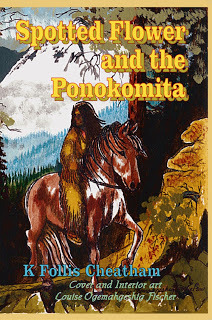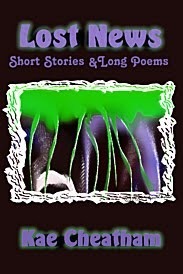Kae Cheatham's Blog: Whoa! Another Author?, page 18
February 7, 2011
Black History Month Author #1
[image error]Frank Garvin Yerby (1916-1991), was born in Augusta, GA. He wrote popular historical fiction, and his books are often categorized as Romance and Gothic. In 1944 Yerby won the O.Henry Award for "Health Card" -- a best first-published short story. In 1946 The Foxes of Harrow was published, and later picked up as a popular Hollywood movie.
The Black literary community criticized Yerby for not giving more attention to racial problems. He moved to Europe in the early 1950's and lived the rest of his life outside the U.S.
Yerby's career boasts thirty-one published titles, many of which have been reprinted in England and U.S, in large print and paperback. He died in Madrid, Spain in 1991.
February 5, 2011
Years of Reading

Ten years ago I began keeping lists of titles and my responses to them. My system was poor; I had each year in a separate file. When I wondered if I'd read an author or title, I had to guess at the year I might have read it—either that or do a Windows "search" for the name.
Now I'm part of Goodreads, and I'm having a great time plugging in the information about books I've encountered during years of reading. I also get to read comments by other readers about the titles, and leave my own reviews. As I plow through my old lists, I'm finding authors I promised myself I'd read more of, but haven't. I've started a new list (arrgh) of authors to check out at my public library. A really fun way to while away snowy winter days.
February 4, 2011
Deadline in Athens - Review
I enjoy books that give a different persective and let me "travel" to new locations. Deadline in Athens did just that.
I had to rethink the way I went into this book; U.S. standards didn't apply. Told in first person, Haritos reflects on page 4: "...who has time to worry about Albanians? If they'd killed a Greek, one of ours...that would be different. But they could do what they liked to each other. It was enough that we provided ambulances to take them away." Actually, the prejudices and reactions presented aren't a lot different from what can be found in police departments in this country. Here, however, in books it's usually a secondary character that is blatant with hostility while the protagonist tsk tsks and attempts to make up for the other's lack of PC.
Not so with Deadline in Athens. In this book, all the characters are very up front with their prejudices; there are also instances of what could be called police brutality but is taken for granted in this Athens atmosphere. This police behavior is also explained a bit, as Haritos thinks back to his days with the military police--to the revolutions just two decades removed within the country--to the different political structure of Greece compared to the States.
But about Inspector Haritos. Putting aside the honest representation of his prejudices, why did he have to emotionally and verbally abuse his wife? By the end of the book, it seems it was part of the roles they played in their marriage, but it nagged at me.
Will this domestic glitch be enough to keep me from reading another Inspector Haritos mystery? Definitely not. Too well written, too unique a story line for me to pass up a title because of My prejudices.
February 2, 2011
What Not To Do
A friend's recent post over at Facebook listed a link to a NYT article about memoirs. In it, the author gives his list of things NOT to do if you're bound and determine to write your memoir. It's unfortunate that the article was a few years too late for author Meloy's The Anthropology of Turquoise. The language was well crafted, but the entirety didn't capture me as a volume of import. I'm sure someone else has/will read it and be smitten.
The Prison Ship also had a few things authors should not do.
Do not think your prose is so witty that it can't be streamlined; do not use adjectives (often multiple adjectives) in eight out of ten sentences; do not sacrifice story line for verbose descriptions (even elegant descriptions) of rooms and restaurants and food.
I admit I'm picky, but phrases such as "wander apparently aimlessly" and "his hands lying apparently idle" and "he moved apparently quite casually" are awkward. As is, "[His thought] of her body beneath the clothes revealed in his memories as effectively as the bodies of travelers passing through the new airport X-ray security machines."
One character spoke "trenchantly" two times in three consecutive paragraphs; or how about "[they effused] angry negativity and almost childishly sulky resentment." I don't think I've read a book with more adjectives and modifiers.
Wedged within this was a mystery that seemed like an afterthought; it was convoluted and overrun by the heavy prose; I found no charm in it.
January 30, 2011
Crossword Quiz
1856
1931
1913
1872
none of the above
 Didn't get it? Click here
Didn't get it? Click hereJanuary 29, 2011
Spotted Flower Goes Kindle

Recent posts in KindleBoards have encouraged me to publish Spotted Flower and the Ponokomita as a Kindle book. A couple of threads at KB talked about kids using Kindles, and the number of youth readers seems to be increasing. I checked the Amazon Kindle listings, and there are already more than 30K kids titles available.
Spotted Flower was my first published book (1978). When it went OOP, I self-published a second edition in 2001, and that has gone to a second printing. My friend Louise Ogemahgeshig Fisher created the cover and illustrations for it. It will be interesting to see how Kindle sales go (It won't be live until Sunday or Monday).
Right now it doesn't have Louise's six illustrations in it; I want to fiddle with the Kindle formatting to get that right. I'm considering adding in a few of the drawings I did for the first edition. Such fun with Kindle to test different ideas and layouts.
Married to Bhutan – Review

I received an ARC of Married to Bhutan from a friend, who just happens to be the author, Linda Leaming. Aha!, you say. Good words for a friend! But no. She didn't ask me to write a review, she merely shared her work. And anyone who knows me is aware that I'm a picky reader—and blunt. If I had not found merit in Married to Bhutan, I would not be writing THIS review.
A "twitter" overview: Woman travels in Asia; becomes enamored with the small country Bhutan; decides to live and work there; marries a Bhutanese man and finds contentment.
But the book is more than a chronology of events. In this book, Leaming not only tells how she came to be in Bhutan, but describes the country and the people in a way that makes the reader understand why she has lived there for more than fifteen years. Insight into her own character and what Bhutan gave to her is interspersed with anecdotal stories of her adjustment. She pokes fun at herself quite often, and recognizes what a novelty she has been for her friends and Bhutanese family.
Through her descriptions, the environment comes alive. I feel that if I were to go to Bhutan tomorrow, I would recognize towns and landscapes. Unlike a travel pamphlet, the book is rich with imagery that describes the land as Leaming experiences it: her walk to work in the morning, her arduous trek to a high mountain retreat; riding along the narrow spirally roads to get from one valley, over the mountains to the next. All five senses are stimulated with Leaming's excellent writing.
Leaming shows how the awesome geography and environment has shaped the people, and has also insulated Bhutan from many cultural changes. On occasion, she speaks of her own frustration brought on by her American upbringing in this society so different from Tennessee. She has the ability to stand back and make quality observations about her own reactions as well as the attitudes and reactions of those around her, even her husband Namgay.
With Married to Bhutan Leaming offers readers a glimpse into a different lifestyle that, for her, was the a good match. If you like history (researched and validated), it's here, along with thousand-year-old stories of culture and philosophy. The strength of the book is in the presentation: it's not pedantic, not breast-beating or patronizing, but a quiet and skillful unfolding of a life rich in complexity and peace of mind.
Highly Recommended.
January 28, 2011
To Fit The Theme

Flash Fiction is fun, and Karen Wojcik Berner posts Flash Fiction Friday each month with different themes. January was "open" month, and I'm pleased to have my "Birthday" story there. Karen also posted one of her stories. A fun read.
"Birthday" is from my short collection LOST NEWS: Short Stories and Long Poems. The primary heading of "Birthday" is "Runaway Dads Cause Problems For Child Aid Programs."
Two headings? Yes, all to fit into the theme; a collection needs a theme. I reflected on what news headlines tell us about real people and events (not much), and I used a Norman Mailer quote: "Once a newspaper touches a story, the facts are lost forever, even to the protagonists." I use a headline as it would be in the paper and then give the fiction title. The short stories and poetic fiction in Lost News could be sidebars to newspaper headlines.
January 27, 2011
Fold and Die - Review
I borrowed Fold and Die from my local Public Library. The cover advertised "back by popular demand," referring to the character, Jordan Lacey and the JL series. It appears, however, that author Stella Whitelaw, after seven other Lacey mysteries, tossed this one out to satisfy her agent or publisher.
The sloppy writing of the first fifteen pages almost convinced me to return the volume to my book bag, but I persisted. The writing improved. The mystery was quite transparent and Lacey never saw the clues. But then she rarely used any investigative skills in this story. I kept reading, hoping my assumptions about the crime and the culprits would be wrong. For me, Jordan Lacy, who is touted as zany came off more as ditzy. A couple of red herring elements were so out of context with the eventual story line and plans of the perps, they seemed more like word-count fill, and for one, Lacey's response was ambivalent.
With a setting of a cruise ship, there were points of interesting information. The tour-guide descriptions of the ship's stop were well written, but added to the ditzy nature of the protagonist—she put her PI job and worries on hold to sightsee.
Overall, I was disenchanted with this. Nice if you want to learn a little bit about cruise ships and Norwegian art and history; but other than that, not so nice.
Character Demand

I have recently been trying to finish a novel that has languished on my hard drive for a while. But I seem to be out of sync with the story and characters.
A while back, Red Adept ran a "chicken/egg" feature, asking authors which came first, the plot or the characters. My answer was characters, definitely. The characters in this particular WIP just aren't stimulating me.
Most often my stories develop like spontaneous combustion--with characters arriving in my head demanding to have their stories told. But this particular WIP started with my desire to relate information about a certain period of history, and I developed the characters I needed to do this. Oops. My bad. I should have written a nonfiction history piece and the development wouldn't have been stalled as it is now.
My local writers group has suggested that I keep reading to them what I've already completed, with hopes their comments and encouragement will inspire me. I will do, but...
I have another piece where the characters keeps nagging me to get back to their story. This manuscript doesn't have as much structure as the plot-driven story, which is why I had put it aside. Finish the the nearly-completed tome, was my thought. I guess I assumed it would be easier.
Got it wrong again.
Okay, characters, here I come!
Whoa! Another Author?
- Kae Cheatham's profile
- 24 followers



